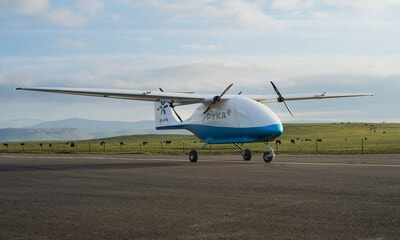Pyka unveils Pelican Cargo, first autonomous electric zero-emission cargo airplane

Pyka, a company working on autonomous electric aviation technology, has unveiled another addition to its fleet of purpose-built industrial aircraft. The new model, the Pelican Cargo, has unprecedented payload and range capabilities.
The Pelican Cargo is the world’s largest zero-emission cargo airplane, serving as the first autonomous vehicle in its class. It was built on Pyka’s autonomous electric flight engine and features an extended range, increased payload capacity and maximized cargo volume.
The new aircraft has a 400-pound may payload with 66 cubic feet of cargo volume and a nose-loading configuration featuring a sliding cargo tray. The autonomous vehicle also has a range of up to 200 miles. The aircraft platform will enable Pyka to enhance express logistics networks, enable connectivity for remote rural communities and ensure quick and reliable access to vital goods and supplies for areas in need.
The Pelican Cargo has four electric motors and four fixed-pitch propellers, two in front of the wing and two behind. It has a service ceiling of 8,000 feet and a climb rate of 1,200 feet per minute. Minimal training is required to operate the aircraft and it includes safety features like a fully redundant propulsion, controls, sensor suite and backup parachute system. For night flying there is GPS and Laser/RADAR-based navigation.
“Pelican Cargo will have a significant positive impact on people’s lives,” Pyka CEO and Co-founder Michael Norcia said. “We designed this plane to eliminate C02 emissions from the logistics chain while offering a significant speed advantage over ground transportation and operating costs at a fraction of conventional air transportation.”
Pyka received pre-commitments for over 80 orders and options for its Pelican Cargo from three launch customers in Europe and North America. The Pelican Cargo is undergoing testing at the company’s flight test facility in Northern California. Commercial operation is slated to begin in the second half of 2023.

“We operate a carefully selected fleet of UAS platforms across our markets, each of which has been chosen due to its operational capabilities and unrivaled performance,” said Alex Brown, Director of Skyports Drone Services, one of Pyka’s launch customers for Pelican Cargo.
“Welcoming the Pelican Cargo aircraft into our fleet will enable us to continue on our mission of solving complex logistical and operational challenges with tailored drone services,” Brown said. “We know a thing or two about drones and in our eyes, the Pelican Cargo is the most advanced product in its payload class on the market. We’re excited to kickstart operations with Pyka and put the Pelican through its paces.”
Pyka, founded in 2017, has been making developments in the electric aviation field, offering quick and environmentally friendly autonomous electric airplanes for commercial agricultural spraying and cargo transport. The company has proprietary technology, including flight computers, flight control software, high-energy-density batteries, carbon composite airframes, and advanced electric propulsion systems.

The serial production of the Pelican began in late 2020, after completing structural load testing and flight-testing programs. The Pelican SN3 was delivered to one of two major launch customers and it completed the final stage of flight demonstration for commercial approval in the U.S. in May 2021.
In July 2021, the Pelican became the first autonomous fixed-wing aerial application on a banana crop.
Pyka had commercial success with its agricultural spray aircraft, leading to a $37 million Series A raise in April 2022. In October 2022, Pyka was given the first-ever regulatory approval to fly unmanned aerial spray missions at night with a fixed-wing aircraft.
The latest expansion into autonomous cargo aircraft shows Pyka’s technology, like a redundant power system that includes three 25kW electric motors and triple redundant batteries to provide a higher level of safety, eliminating single points of failure.

The lightweight airframe is made of high-performance carbon fiber composite parts, corrosion-resistant metallic components and 3D-printed assemblies with an industry-standard manufacturing process.
Contact
Name: Haley Davoren
, Digital Content Manager
Company: GlobalAir.com
Website: https://globalair.com
Email: [email protected]
Phone: 502-456-3934
©2023 GlobalAir.com, Haley Davoren. All rights reserved.

Recent Comments